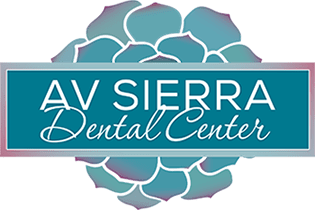E-Cigarettes and Your Oral Health: The Smokeless Threat to Your Smile
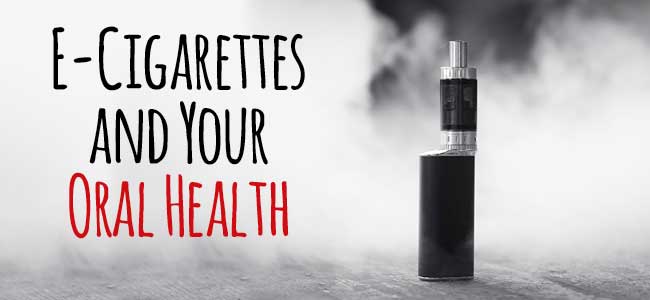
For many smokers, e-cigarettes seem like the best answer to avoiding the nasty side effects of smoking traditional cigarettes, including the odor and the staining of teeth, skin, and clothing. Though e-cigarettes still contain the highly addictive chemical nicotine, tobacco and other harmful elements are eliminated from the electronic smoking process, or what some refer to as “vaping.” The growing popularity of e-cigarettes and vaping, especially among young people, has caused a rise in concern over the lack of knowledge around the effects it has on health. While clinical studies are currently underway, in 2014 the U.S. Food and Drug Administration (FDA) released a statement saying “e-cigarettes have not been fully studied, so consumers currently don’t know the potential risks of e-cigarettes when used as intended, how much nicotine or other potentially harmful chemicals are being inhaled during use, or whether there are any benefits associated with using these products.” Vaping has a direct effect on oral health. Exposure to e-cigarette aerosol can lead to an increase of bacteria in the mouth, which is associated with gum disease, cavities, and tooth decay. The flavoring added to many e-cigarettes can also lead to cavities, not to mention an increased chance of developing chronic lung diseases. It can also cause dry mouth, inflamed gums, and other issues dentist are able to speak to how these new smoking devices threaten your oral health. Nicotine is harmful to your teeth and gums, even in the absence of tobacco and other chemicals traditionally found in cigarettes. Electronic cigarettes still deliver nicotine to their users through the mouth, throat, and lungs. The following are some of the consequences that come with using smokeless cigarettes. Gum Disease: One of the highest risks of e-cigarettes is an increased risk of gum disease coming from three specific conditions. Nicotine leads to Vasoconstriction, which is the limiting of the blood supply to the gums. When the blood supply to your gums is reduced it makes the more susceptible to infection and can lead to gum recession. Gum disease is caused by plaque bacteria. Smoking dries out your mouth, creating an environment that is more conducive for bacteria growth. Your immune system is weakened as a result of smoking, so infectious diseases can develop at a faster rate. It’s important to note that in addition to the problems caused by vasoconstriction one of the telltale signs of gum disease is swelling of the gums caused by irritation. When nicotine reduces blood flow, preventing swelling, this indication of gum disease can be masked, causing your dentist to miss the symptoms and allowing the disease to progress. Gum Recession: Lack of blood flow to the gums keeps the tissue from receiving the nutrients it needs to survive. Over time the skin dies and recedes. Bad Breath: Nicotine restricts your body’s ability to produce saliva, which makes your mouth vulnerable to harmful bacteria and tooth decay. Combined, dry mouth and bacteria lead to halitosis, which can be embarrassing and can affect your self-esteem. Intense Grinding: As a stimulant, nicotine causes muscles to tighten and spasm against the user’s will. It can cause sleep disturbances such as insomnia and grinding of the teeth. Grinding, especially while sleeping, can be damaging to teeth and result in the loss of tooth enamel, as well as chipping, cracking, and breaking of teeth. If you want to maintain your best oral health, avoiding any type of smoking is recommended. If you do choose to smoke, keeping it to the minimum and maintaining your best at-home oral hygiene practices as well as your routine visits to the dentist is important. If you see signs of periodontal disease (including red, swollen, bleeding, or receding gums) or experience bad breath, painful chewing, or loose teeth, make sure to contact your dentist immediately. There are treatments you can receive that will help keep your teeth and gums in the best possible condition. Two such treatments include: Professional dental cleanings Plaque and tartar are removed from above and below the gumline. If you have gingivitis or signs of periodontitis, you will be required to have this level of cleaning twice a year or more. Scaling and root planing Plaque and tartar are scraped away from both above and below the gumline while under local anesthetic (scaling). Rough spots on the tooth root are then smoothed out (planing). Locally applied medications, such as antimicrobials and antibiotics, may be used. If you are experiencing jaw tightness or pain, and you think you might be grinding your teeth, your provider can fit you with a mouthguard that will protect your teeth while you sleep. It can be difficult to share your habits with your dentist. At AV Sierra Dental Center, we treat our patients with respect and compassion. We are here to help you be your healthiest self. If you use e-cigarettes and are concerned about how they may be affecting your oral health, call us today and set up a consultation. We will help you protect your teeth and maintain your natural smile.
When Should You Change Your Toothbrush?
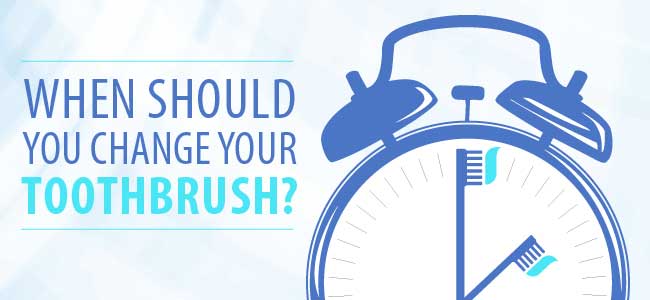
Keep Your Toothbrush in Fighting Shape Everything You Need to Know About Your Toothbrush You hear it time and time again: Brush your teeth at least twice a day. It becomes so routine that you brush your teeth while juggling a few other tasks at the same time. How much time goes by before you notice the shape your toothbrush is in? Have you ever thought to yourself, “I don’t need to clean my toothbrush, my toothbrush cleans me!” The condition of your toothbrush is often the last thing you think about in your busy life, but it plays a significant factor in your oral health. Symptoms of an Unclean, Older Toothbrush The most common issue with an older toothbrush is effectiveness. When the bristles are frayed, its cleaning ability is compromised — leaving your teeth more exposed to bacteria. According to the American Dental Association (ADA), you should monitor and replace your toothbrush more often if you or a family member have: A systemic disease that may be transmissible by blood or saliva A compromised immune system or low resistance to infection due to disease, chemotherapy, radiation treatment, etc. How to Disinfect Your Toothbrush Rinse and air dry. The simplest way to keep your toothbrush clean: After every use, rinse it and keep it upright in an open area. Soak it in hydrogen peroxide. Boil it in hot water. This is another simple option, but be sure the toothbrush is completely cooled before handling/using. No one wants scalded gums. Use an ultra-violet light toothbrush sanitizer. These sanitizers made for toothbrushes (more specifically, electric toothbrush heads) are a good option, but studies show that while they do kill bacteria, they don’t have a distinct advantage over any other method. The ADA warns to be wary of any product that says it will do more than sanitize or reduce bacterial contamination. If you are interested in a toothbrush sanitation product, make sure it is Food and Drug Administration approved. There isn’t an obvious answer as to which method is preferred or best, so do what works for you. Not Recommended Toothbrush Care Microwave: While this idea makes sense on paper, the ADA doesn’t approve. It will most likely kill bacteria on your toothbrush, but zapping it can have adverse effects on the brush itself. Dishwasher: While this is an effective way to clean your toothbrush, the ADA states that this method will also compromise the quality of your brush. How Often Should I Change My Toothbrush? For typical usage with no special circumstances, you should change your toothbrush every three to four months. If you see that your toothbrush bristles are frayed or beginning to fray, replace it. If your toothbrush seems to fray too fast, you are mostly likely brushing too hard — go easy on those teeth! Do I Need to Change My Toothbrush After I’ve Been Sick? Research shows that this is unnecessary. While those germs are still on your toothbrush, your body has the antibodies to fight off anything related to that particular sickness you just got over. With this in mind, don’t share said toothbrush (or any toothbrush, for that matter) with another person, because they can get sick from those germs. To keep your teeth strong and your mouth healthy, the quality of your toothbrush absolutely matters. It is important to keep your brush as clean as possible while you are using it. The most beneficial thing you can do is keep track of how long you have been using your toothbrush and replace it routinely. For more information, contact your Palmdale, CA dentist at AV Sierra Dental Center today. Reference: https://www.ada.org/en/about-the-ada/ada-positions-policies-and-statements/statement-on-toothbrush-care-cleaning-storage-and-
Protect Your Teeth: Preventive Steps Toward Better Oral Health
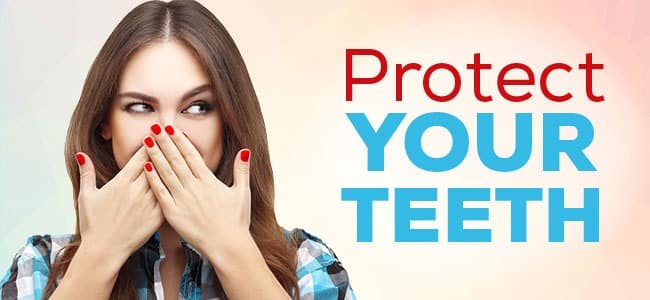
Taking preventive measures to protect your teeth from decay is essential for maintaining your natural smile. While prevention includes maintaining good at-home oral hygiene practices and making it to your routine dental visits, there are additional steps you can take to help keep your teeth healthy, strong, and safeguarded against the harmful bacteria that leads to decay and cavities. Some of the following preventive measures are commonly associated with protective treatments appropriate for children, but they can be just as beneficial for adult teeth. The next time you pop in for your regular exam, take some time to ask the doctor about whether they are right for you. Sealants Brushing and flossing cleans most of your teeth surfaces, but getting to all of the crevices — especially those located in the back molars and premolars — is difficult. Those tiny dips and pits are perfect for trapping food and bacteria, which often results in the formation of cavities. Dental sealants provide a protective coating that keeps these areas free from food debris. They are made from a resin material that is used to coat the chewing surfaces of the back teeth. It is painted on and seals the nooks and crannies in the teeth, so that food and other plaque-causing materials that cause cavities are kept out. The procedure for applying sealants is simple, painless, fast, and takes only one visit. First the decay is removed from your teeth, and they are thoroughly cleaned and dried. Next the sealant material is painted on the chewing surface. It will naturally bond to the tooth on its own; however, a special light may be used to speed the process, helping the sealant to harden in just a couple of minutes. Fluoride Treatments Fluoride is a naturally occurring mineral that can be found in both food and water. It aids in the prevention of tooth decay and cavities by making teeth resistant to the acids created by plaque and sugars. Fluoride is deposited on tooth enamel when you eat foods and beverages that contain it; it is lost when the acids produced by plaque and sugars eat away at the enamel of a tooth. Tooth decay occurs when the amount of fluoride lost outweighs what is being deposited. Most often fluoride and its use in dental treatments is associated with children and the strengthening of their young, vulnerable teeth. Although fluoride is important for young children, it is also beneficial for adolescents and adults of all ages. In fact, new research indicates that fluoride’s role in fighting tooth decay as we age is just as important as its role in the strengthening and protection of newly developing teeth. A fluoride treatment involves applying fluoride topically to teeth. The in-office fluoride treatment is quick and painless, and it involves applying fluoride in the form of varnish, gel, or foam directly onto the teeth. This can be accomplished by wearing a mouthguard filled with the foam or gel or by having varnish painted directly onto your teeth. Hygiene Services In addition to sealants and fluoride treatments, there are two important hygiene services that can improve your chances of avoiding decay, cavities, and tooth loss. Periodontal treatment: This treatment prevents the progression of periodontal disease and returns teeth and gums to a healthy state. Professional teeth cleanings: Having your teeth cleaned regularly helps prevent gingivitis, tooth decay, and loss of enamel from teeth. Some of the services included during your regular cleaning include: A review of your dental and medical history An oral cancer screening An evaluation of your overall oral health X-rays to detect decay Removal of stains, plaque, and tartar Polishing of all teeth At-home oral health education and instruction Keeping your natural smile for a lifetime is possible when protective measures are taken and the proper dental care is received. Your oral health is our top priority, and making sure your teeth stay healthy and beautiful is our mission. Call us today to find out more about how we can help protect your smile against decay.
Summer is Here! Are your Lips Ready?

“Summer loving had me a blast, oh yeah. Summer loving happened so fast…” —Grease, Summer Nights Its’ the stuff dreams and movies are made of: summer love. Warm summer nights, afternoons at the beach, vacations to the Caribbean—whether you are hoping to meet your next crush or are looking forward to romancing your long-time love —summer is sure to heat things up. Did you know that June 19th is National Kissing Day? Are you ready to get romantic? A healthy mouth and kissable lips are key to having the summer you have been dreaming of. From making sure that your teeth and gums are in top condition, to protecting and caring for your lips so they stay soft and blemish free, there are several measures you can take to stay romance ready all summer long. Tips for a healthy mouth The best way to make sure that your mouth stays healthy and halitosis free is to stay on top of your at-home oral hygiene practices. Don’t forget the basics: Brush twice a day Rinse after brushing Floss daily Take your oral care to the next level. You already know you need to set up routine visits with your dentist to keep your teeth in top condition. Consider the following treatments for extra protection. Regular fluoride treatments can help keep your teeth strong, especially if your water source is fluoride free. Dental sealants can protect your teeth from decay. Consider having them applied to your back teeth. Along with your routine cleanings, try a whitening treatment so that your healthy smile shines through. Taking care of your lips If you are concerned about keeping lips kissable, consider the following tips: Apply balm to your lips before you wash your face. It protects them from drying elements in your cleanser that can cause them to chap and flake. Use a humidifier at night to keep your skin (including your lips) moisturized. Don’t pick at flakey lips. Instead, remove the extra skin with a lip exfoliator or combine sugar and honey for a natural exfoliator. Protect your lips from the rays with sunscreen. If you wear lipstick, try to find one with vitamin E or Shea butter in it. Stay hydrated with water. Drink. Drink. Drink! If your lips are chapped, avoid spicy foods, foods high in citrus, and salt. They will only cause lips to dry out more. Avoid licking your lips. The acids in your saliva can cause irritation. When cold sores appear Nothing kills the mood like a cold sore. They are painful, unsightly, and contagious. They make talking and eating uncomfortable, and can be confidence busters when trying to woo someone. Cold sores heal over the course of seven to 14 days, but true love doesn’t wait. There are over-the-counter treatments that come in the form of messy ointments and creams that make the lesions more noticeable when applied while only reducing the healing time by 1 to 2 days. Or, you can talk to your dentist about getting immediate results with laser therapy. Laser therapy uses photonic laser energy to destroy the active virus responsible for the oral lesions and is accomplished quickly and comfortably without the need for anesthetic. Often, those who seek treatment at the first signs of the virus (tingling, and light burning sensations) don’t develop sores. However, if sores have already erupted the progression is stopped, and the appearance and discomfort is greatly decreased. Your lips will immediately appear significantly clearer, and be completely lesion-free in typically one to two days allowing you to feel more confident about getting cuddly. The benefits of laser therapy include: Profound and immediate pain relief Treatment stops lesions’ progression immediately Significantly reduces healing time Treatment time of just a few minutes Treatment is painless and can be conducted with out anesthetic (it feels like warm air blowing) After treatment, sores reoccur with less frequency and less intensity at the same location Treatment is affordable and can be insurance reimbursable With a little extra effort and support from your dental care providers, this summer is sure to be the best yet. Don’t let chapped lips or bad breath stand in the way of getting cozy under the summer night sky with that someone special. Call us today to schedule your next appointment or a cleaning and get your summer started off right.
Am I at Risk? The Question That’s on Everyone’s Lips
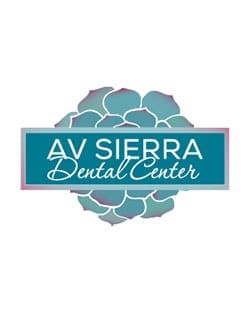
Speaking, eating, and smooching — these are all daily activities that draw attention to your lips. You most likely catch a glimpse of them every time you look in the mirror throughout the day, like when you brush your teeth during your morning routine and then again before going to bed. With their high visibility, you might guess that identifying lip cancer in its earliest stages would be common, but you might be surprised at how often early signs go unnoticed. Skin cancer is the most common type of cancer in the U.S., and according to the American Dental Association, 41,000 Americans will be diagnosed with oral and throat cancers this year. With 60% of the U.S. population visiting the dentist each year, where there mouths are closely examined and oral cancer screenings are done routinely, the dental community is the first line of defense for early detection. What Is the Difference Between Lip and Oral Cancer? Lip cancer is one kind of oral cancer. Simply put, cancer is the rapid and uncontrollable growth of invasive cells that damage surrounding tissue. When this occurs on or in the mouth, it is referred to as oral cancer. A notable difference between lip cancer and cancer that occurs inside the mouth and throat is the added risk factor of prolonged exposure to the sun. Lip cancer is often caused by the harmful effects of ultraviolet light, and the lower lip specifically has the greatest risk because it has more exposure to the sun. Risk Factors While sun exposure increases the likelihood of suffering from lip cancer, there are other factors that increase your risk for oral cancer, most of which are avoidable. Tobacco: Tobacco use of any kind increases your chances of getting oral cancer. Alcohol: Heavy alcohol use and abuse has been found to be a risk factor. Sun exposure: Individuals who have regular, prolonged exposure to the sun are more likely to be diagnosed with cancer of the lips. HPV: HPV is tied to the development of cervical cancer and is also a risk factor for oral and oropharyngeal cancers. Dentures: Though the connection is debated, some believe that poorly fit dentures that cause long-term irritation of the mouth lining may lead to cancer. It is important that patients who wear dentures have the fit checked regularly, along with a regular oral cancer screening, to minimize their risk. Signs of Oral Cancer Cancer of the mouth reveals itself as a growth or sore in the mouth or throat that doesn’t go away with time. Other symptoms include: Red or white patches on the lining of the mouth or tongue Swelling or thickening of areas inside the mouth Unexplained bleeding Sores on the face, neck, or mouth that do not heal Chronic sore throat Hoarseness A change in the way your dentures fit Though early detection is key to surviving oral cancer, prevention should always be the top priority. Oral and Lip Cancer Prevention There are some simple preventive steps you can take to minimize your risk of getting oral cancer: Good oral hygiene: Gum disease and tooth decay introduce infections into your mouth. This increases the risk of getting oral cancer. Make sure to brush, floss, and rinse daily. Make your routine visits: Your routine visits to the dentist are important. Our providers do more than make sure your teeth are clean; they are skilled at detecting the earliest signs of cancer, and they examine you thoroughly at every visit. Don’t engage in high-risk behaviors: Avoid smoking and smokeless tobacco, and minimize your consumption of alcohol. Use sun protection: If you are going to be spending time in the sun, use a broad-spectrum lip balm and sunscreen for your face and exposed skin. A broad-rim hat is an excellent choice for extra protection of face and lip areas. Performing a Self-Examination While performing a regular self-examination is a must, your own regular self-exam should not take the place of a routine dental visit. You may not be able to adequately see signs and symptoms that your dentist can easily identify. To perform your at-home self-exam, take the following steps: Stick out your tongue as far as you can and examine all sides and the underneath for lumps and discolored patches. Use your fingers to feel the inside surface of your cheeks and your lips for bumps or sore areas. Inspect the floor of your mouth for lumps as well as white and red patches that shouldn’t be there. Inspect the top of your mouth, and then depress your tongue and check your tonsils for abnormal enlargements, redness, symmetry, or bumps. Inspect your neck for enlarged lymph nodes or irregular bumps by palpating it with your fingers. Visiting your dentist for regular examination significantly improves the chances that abnormalities in your mouth will be caught and examined, greatly improving your chances of successful treatment should any abnormalities be cancerous. If you have questions or concerns about oral or lip cancer, call us today. We can provide you with the information you need and schedule a reassuring oral cancer screening for you as well.
